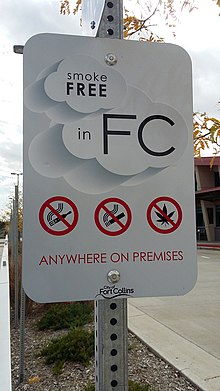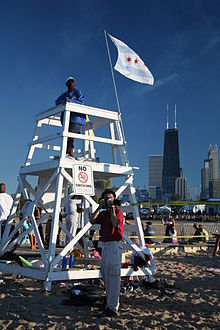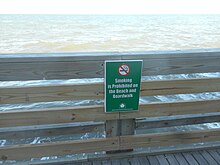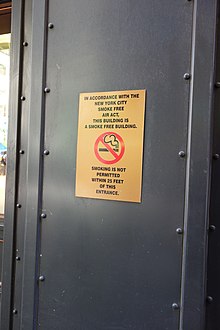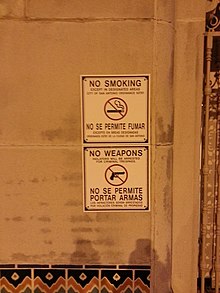List of smoking bans in the United States
The United States Congress has not attempted to enact any type of nationwide federal smoking ban in workplaces and public places.
[3] A smoking ban (either state or local) has been enacted covering all bars and restaurants in each of the 60 most populated cities in the United States except these ten: Henderson, Jacksonville, Las Vegas, Memphis (no smoking in restaurants, government buildings and most indoor public places), Miami, Oklahoma City, Philadelphia, Tampa, Tulsa, and Virginia Beach.
[4][5] As of July 2018, 29 states have enacted statewide bans on smoking in all enclosed workplaces, including all bars and restaurants: Alaska, Arizona, California, Colorado, Connecticut, Delaware, Hawaii, Illinois, Iowa, Kansas, Maine, Maryland, Massachusetts, Michigan, Minnesota, Montana, Nebraska, New Jersey, New Mexico, New York, North Dakota, Ohio, Oregon, Rhode Island, South Carolina, South Dakota, Utah, Vermont, Washington, and Wisconsin.
Ten other states have enacted statewide smoking bans but have carved out an exception for certain establishments and workplaces: Arkansas, Florida, Idaho, Indiana, Louisiana, Nevada, New Hampshire, North Carolina, Pennsylvania, and Tennessee.
All except six (Alaska, Michigan, Indiana, North Dakota, Vermont, and Wisconsin) allow hotels and motels to designate a certain percentage of smoking rooms.
In California, Connecticut, Delaware, Hawaii, Maine, New Jersey, North Dakota, Oregon, Utah, and Vermont, usage of e-cigarettes is prohibited indoors.
As of July 2018, four states have enacted smoking bans in particular places that do not fit in the other categories: As of July 2018, twelve states have not enacted any general statewide ban on smoking in workplaces, bars or restaurants: Alabama, Arkansas, Georgia, Kentucky, Mississippi, Missouri, Oklahoma, South Carolina, Texas, Virginia, West Virginia, and Wyoming.
In Kentucky, Missouri, South Carolina, Texas, and West Virginia, a court has ruled that certain local governments have the power to do so.
In the District of Columbia, American Samoa, Puerto Rico and the United States Virgin Islands, smoking is banned in all enclosed public places, including bars and restaurants.
(a) A landlord of a residential dwelling unit, as defined in Section 1940, or his or her agent, may prohibit the smoking of a cigarette, as defined in Section 104556 of the Health and Safety Code, or other tobacco product on the property or in any building or portion of the building, including any dwelling unit, other interior or exterior area, or the premises on which it is located, in accordance with this article.
(b) (1) Every lease or rental agreement entered into on or after January 1, 2012, for a residential dwelling unit on property on any portion of which the landlord has prohibited the smoking of cigarettes or other tobacco products pursuant to this article shall include a provision that specifies the areas on the property where smoking is prohibited, if the lessee has not previously occupied the dwelling unit.
(c) A landlord who exercises the authority provided in subdivision (a) to prohibit smoking shall be subject to federal, state, and local requirements governing changes to the terms of a lease or rental agreement for tenants with leases or rental agreements that are in existence at the time that the policy limiting or prohibiting smoking is adopted.
[326] Since 2006, smoking in state offices, vehicles, and buildings (except for correctional facilities) has been banned by executive order issued by the Governor of Virginia.

